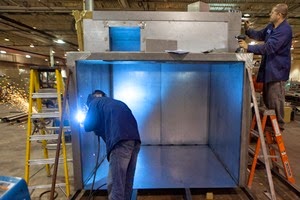If you’re considering purchasing an industrial oven, there are many elements that need to be considered regarding oven construction. The following represent the more significant points of examination.
 Exterior – An oven exterior should be constructed of heavy gauge cold rolled steel and painted with a chip/scratch resistant enamel paint. In the eventuality that an operating environment has corrosive fumes, a stainless steel exterior is recommended.
Exterior – An oven exterior should be constructed of heavy gauge cold rolled steel and painted with a chip/scratch resistant enamel paint. In the eventuality that an operating environment has corrosive fumes, a stainless steel exterior is recommended.- Interior – An oven interior ought to be of aluminized steel. Aluminized steel is manufactured to resist the corrosive effects of moisture and heat, as well as other materials. If processes contain acids or corrosive materials, a stainless steel interior should be selected.
- Duct work – The duct work of an oven, in terms of materials, follows the same guidelines as the oven interior.
- Insulation and oven wall-panel construction – These are the two key elements which allow an oven, which is running at 1250°F, to remain cool to the touch on the oven’s exterior. Quality insulation should be the proper density, oversized and compressed into the panel to avoid sagging. The physical strength of an oven is found in the wall panel construction and the overall frame, also the wall panel should allow for minimal transfer of heat to the outer skin.
- Control panel – The control panel is of significant concern because it’s the primary component with which the operator will interact. Consequently, a high quality control panel must possess the following characteristics:
- Large push-button operation
- Legible legend plates
- Clear readouts on the controllers, timers, and recorders
- UL-listed
Have more questions? Contact Precision Quincy Ovens sales and engineering professionals to clarify your requirements, get your questions answered, and learn about their oven solutions. Precision Quincy Ovens has earned a position at the top of the industrial oven market by consistently producing innovative and high-quality ovens.

 Exterior – An oven exterior should be constructed of heavy gauge cold rolled steel and painted with a chip/scratch resistant enamel paint. In the eventuality that an operating environment has corrosive fumes, a stainless steel exterior is recommended.
Exterior – An oven exterior should be constructed of heavy gauge cold rolled steel and painted with a chip/scratch resistant enamel paint. In the eventuality that an operating environment has corrosive fumes, a stainless steel exterior is recommended.